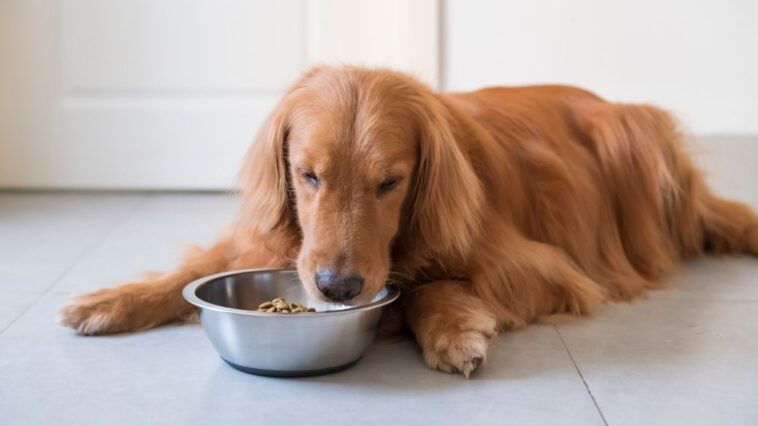Dogs are known for their love of food, but not all human foods are safe for them to eat. As pet owners, we want to provide our furry friends with a balanced diet that meets their nutritional needs and keeps them healthy.
But what about potato skins? Are they safe for dogs to eat? The answer may surprise you. While some sources claim that potato skins are toxic to dogs, others argue they are perfectly safe in moderation.
As a responsible pet owner, it’s important to understand the potential risks and benefits of feeding your dog potato skins. In this article, we’ll explore both sides of the debate and provide the information you need to decide whether or not to include potato skins in your dog’s diet.
Can Dogs Eat Potatoes Skin?
Dogs can eat potatoes, but it’s important to prepare them properly and consider a few factors. In general, the flesh of potatoes is safe for dogs to consume in moderation. However, the potato skin can be more problematic.
The skin of a potato is known to contain solanine, a natural toxin that can be harmful to dogs if consumed in large quantities. While small amounts of solanine are unlikely to cause severe issues, it’s best to err on caution and remove the skin before feeding potatoes to your dog.
Moreover, potato skin can also pose a choking hazard or cause digestive issues, especially if it is tough or not cooked properly. To make potatoes safe for your dog to eat, peel the skin off and ensure they are thoroughly cooked. Boiling or baking potatoes without additional seasoning is a good way to prepare them for your canine companion.
Every dog is different, and some may have specific dietary restrictions or sensitivities. If you have any concerns about feeding potatoes to your dog or any other aspect of their diet, it’s always wise to consult with your veterinarian for personalized advice.
Nutritional Value of Potato Skin
If you’re considering feeding your dog potato skins, it’s important to understand their nutritional value. Potato skins are a good fiber, vitamin C, and potassium source. They are also low in fat and calories, making them a healthy dog treat.
However, it’s important to note that potato skins are only a partial food source for dogs. They should never replace a balanced diet or be your furry friend’s main source of nutrition. Additionally, potato skins should always be fed in moderation, as excessive consumption can lead to digestive issues.
In conclusion, potato skins offer some nutritional value for dogs, but they should never replace a balanced diet or be the main source of nutrition.
Health benefits and risks of feeding potato skin to dogs
Now that we’ve established that potato skins are safe for dogs to eat in moderation and offer some nutritional value let’s explore the potential health benefits and risks of feeding them to your furry friend.
One potential benefit of feeding your dog potato skins is their high fiber content. Fiber is important for digestive health and can help regulate bowel movements. Additionally, the vitamin C found in potato skins can help boost your dog’s immune system and protect against illness.
On the other hand, some potential risks are associated with feeding your dog potato skins. As mentioned previously, potato skins contain solanine, which can be toxic in high doses. Additionally, the high fiber content of potato skins can lead to digestive issues such as diarrhea and bloating if consumed in excess.
In conclusion, while feeding your dog potato skins has some potential health benefits, some risks should be considered. Always feed potato skins in moderation and monitor your dog for any signs of digestive issues or toxicity.
How to Prepare Potato Skin for Dogs
When preparing potato skins for dogs, it’s important to keep the following guidelines in mind:
- Wash the potatoes: Thoroughly rinse the potatoes under running water to remove any dirt, debris, or potential contaminants from the skin. This step is essential to ensure the potato skins are clean and safe for your dog to consume.
- Cook the potatoes: It’s recommended to cook them before serving them to your dog. You can boil, bake, or steam them until soft and fully cooked. Avoid using oils, butter, or seasonings during the cooking process, as these can harm dogs.
- Cool and remove any toppings: Once the potatoes are cooked, allow them to cool down completely. Remove any toppings or fillings that may be present, such as cheese, sour cream, or bacon bits. These additional ingredients are not suitable for dogs and should be avoided.
- Serve in moderation: Cut the potatoes into small, bite-sized pieces, including the skin, and offer them to your dog in moderation. Remember that potatoes should not be the main component of their diet but rather an occasional treat or addition to their regular meals.
- Observe your dog: When introducing any new food into your dog’s diet, monitoring them for any adverse reactions or digestive issues is important. Watch for signs of upset stomach, diarrhea, or allergies. If you notice any negative reactions, discontinue feeding potatoes and consult your veterinarian.
Always consult your veterinarian before introducing new foods to your dog’s diet, including potato skins. They can provide specific guidance based on your dog’s needs and dietary requirements.
Other Human Foods That Dogs Can Or Cannot Cat
Terre are several human foods that dogs can or cannot eat. Here are some examples:
Foods dogs can eat in moderation:
- Lean meats: Cooked chicken, turkey, and lean cuts of beef are generally safe for dogs as long as they are boneless and free of seasoning or marinades.
- Plain-cooked eggs: Eggs can be a good source of protein for dogs, but they should be thoroughly cooked without any seasoning or added ingredients.
- Plain rice and pasta: Plain, cooked rice or pasta can be offered to dogs in small amounts, as long as it is not seasoned or mixed with and sauces or spices.
- Fruits: Some fruits, such as apples (without seeds or core), bananas, and blueberries, can be given to dogs as treats. However, avoid grapes, raisins, and other fruits that can be toxic to dogs.
- Vegetables: Dogs can enjoy carrots, green beans, and sweet potatoes. These should be cooked or steamed without any added seasoning or butter.
Foods dogs should avoid or only eat in limited quantities:
- Chocolate: Chocolate is toxic to dogs due to the presence of theobromine. Even small amounts can be harmful and potentially fatal.
- Onions and garlic: These can damage a dog’s red blood cells.
- Grapes and raisins: Grapes and raisins can cause kidney failure in dogs, so keeping them away from these fruits is important.
- Avocado: Avocado contains a substance called persin, which can be toxic to dogs and may cause digestive upset or more severe symptoms.
- Alcohol: Alcohol is highly dangerous for dogs, even in small amounts. It can cause intoxication, respiratory distress, and even death.
It’s important to note that dogs may have different tolerances and sensitivities to certain foods. When introducing new foods into your dog’s diet, always do so in moderation and monitor for any adverse reactions. If you have any doubts or concerns, consult your veterinarian for specific guidance based on your dog’s needs and health condition.
Signs of Potato Skin Poisoning in Dog
If your dog consumes too much potato skin, it may experience poisoning symptoms. Some signs of potato skin poisoning in dogs include vomiting, diarrhea, abdominal pain, lethargy, and even seizures in severe cases.
If you suspect that your dog has consumed too much potato skin, it’s important to contact your veterinarian immediately. They may recommend inducing vomiting or administering activated charcoal to help absorb the toxins.
In conclusion, while potato skins may be safe for dogs to eat in moderation, it’s important to be aware of the potential symptoms of poisoning if consumed in excess. Always monitor your dog for any signs of toxicity and contact your veterinarian if you suspect they have consumed too much.
What To Do if Your Dog Consumes Too Much Potato Skin
If your dog consumes too much potato skin or any food in excess, there are a few steps you can take:
- Assess the situation: Determine the quantity of potato skin your dog has consumed and monitor their behavior and symptoms. If your dog has only eaten a small amount, it may be fine, but if they have ingested a large amount or are showing signs of distress, it’s important to take action.
- Contact your veterinarian: If your dog has consumed a significant amount of potato skin or exhibits any concerning symptoms, contact your veterinarian immediately. They can provide guidance based on your dog’s specific situation and advise you on the best course of action.
- Observe for symptoms: Keep a close eye on your dog for any signs of discomfort, digestive upset, or unusual behavior. Symptoms to watch for include vomiting, diarrhea, abdominal pain, excessive drooling, lethargy, or difficulty breathing. If any of these symptoms occur, seek veterinary assistance promptly.
- Follow veterinary advice: Your veterinarian may recommend different actions depending on the circumstances. They may advise inducing vomiting at home (only under their guidance), bringing your dog in for an examination, or closely monitoring your dog’s condition at home. Always follow their instructions carefully.
- Prevent future incidents: Take steps to prevent your dog from accessing large quantities of potato skin or any other food it shouldn’t consume. Store food securely and safely, and be mindful of what is within your dog’s reach.
Remember, it’s always better to be cautious about your dog’s health. Consulting with a veterinarian is crucial for accurate advice and guidance tailored to your dog’s situation.
Conclusion
In conclusion, potato skins can be safe for dogs to eat in moderation and offer some nutritional value. However, it is important to prepare them properly and monitor your dog for any signs of digestive issues or toxicity.
Always consult your veterinarian before feeding your furry friend any new foods, and be aware of other human foods that should be avoided. By following these guidelines, you can provide your dog with a healthy and balanced diet that meets their nutritional needs and keeps them happy and healthy.




